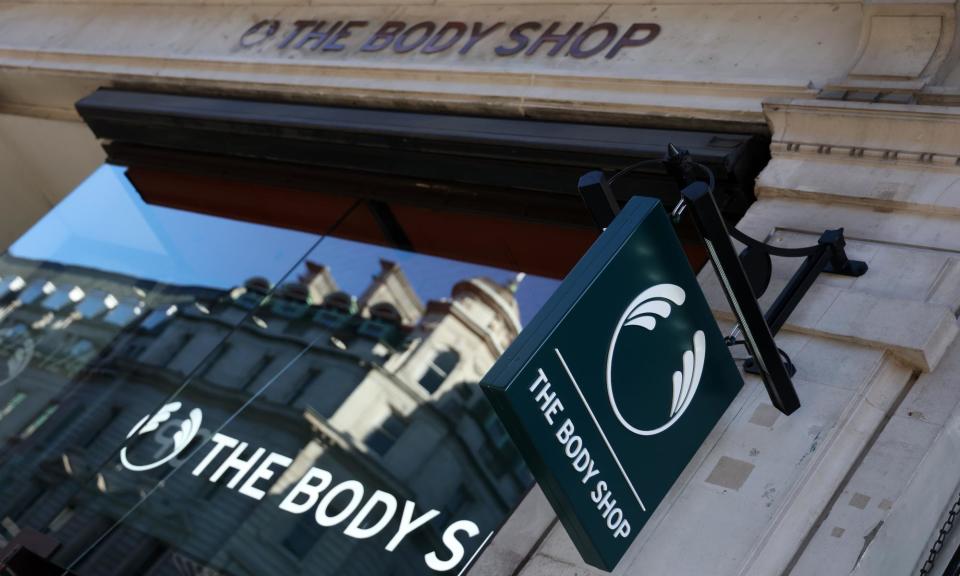The Body Shop collapses into administration in UK

The Body Shop has collapsed into administration in the UK less than three months after it was taken over by a private equity company, in a move that puts more than 2,200 jobs at risk at the cosmetics chain.
Aurelius, the German company that bought The Body Shop for £207m in November, said it had been unable to revive the fortunes of the business after dismal trading over Christmas and new year.
Aurelius confirmed it had appointed the accounting firm FRP Advisory as the administrator, raising concerns over the future of the business founded by the late environmental and human rights campaigner Anita Roddick in 1976.
The Body Shop has almost 200 shops in the UK as well as a distribution centre and head office.
Related: ‘Scent of a generation’: the Body Shop products consumers loved
In a statement, the administrators said: “Today, the directors of The Body Shop International Limited have appointed Tony Wright, Geoff Rowley, and Alastair Massey of business advisory firm FRP as Joint Administrators of the company, which operates The Body Shop’s UK business.”
The company, they said, had “faced an extended period of financial challenges under past owners, coinciding with a difficult trading environment for the wider retail sector” and they would “consider all options to find a way forward for the business and will update creditors and employees in due course”.
Last month Aurelius closed down the direct sales business, The Body Shop at Home, and sold off its stores in Europe and parts of Asia – which are understood to have been loss-making.
Sources familiar with the situation said they expected the brand to survive in some form but with far fewer shops. Aurelius itself is thought to be a likely buyer for a honed down business – with perhaps only 100 stores – but it is clear that administrators have already been in touch with other potentially interested parties. Industry bidders such as Next are thought to be among those interested.
Next has acquired a stable of brands, from Cath Kidston to Fatface, which it now stocks in its high street stores and online. It is a trend that has gathered pace as internet sales have dented bricks and mortar retail, with Argos and Habitat now part of Sainsbury’s and Frasers Group snapping up dozens of brands from Agent Provocateur to Jack Wills.
One beauty industry expert said The Body Shop was not a brand that could work as a wholesale collection on other retailers’ shelves and would need a chain to ensure the details of its ethical sourcing were properly communicated. “If you stick a few products on a shelf in Boots you would lose the magic,” the source said.
Mass store closures affecting the remainder of the business would mark the latest stage in the decline of a brand that Roddick and her husband, Gordon, built into a worldwide symbol of fair and sustainable trading. Roddick opened her first shop in Brighton in 1976, expanding rapidly through a franchise model and adhering to strict moral principles.
The company remained under family ownership for three decades until they sold it to the French cosmetics corporation L’Oréal, the owner of Maybelline and Garnier, for £652m in 2006. Roddick died the following year. By then, The Body Shop had become synonymous with its ethical positions, including a refusal to stock products tested on animals and the sourcing of natural ingredients that were traded ethically.
The decision to sell to a global corporation disappointed many loyal customers and cleared the way for rivals such as Lush, Neal’s Yard and Aesop to step in.
As The Body Shop’s sales and profits flagged, L’Oréal sold it on to Brazil’s Natura, a more natural fit as the owner of Australian natural beauty brand Aesop. However, it then went on to buy the home-selling cosmetics group Avon in 2019, a badly timed deal that left it with a hefty debt pile as the Covid pandemic hit and then interest rates began to rise around the world.
Natura decided to focus on its core Latin American market and clear its debts by selling Aesop and The Body Shop, with Aurelius one of few bidders to come close to the asking price.
The administrators said “focusing on the UK business is the next important step in The Body Shop’s restructuring”, adding: “Taking this approach provides the stability, flexibility and security to find the best means of securing the future of The Body Shop and revitalising this iconic British brand.”

 Yahoo Finance
Yahoo Finance 